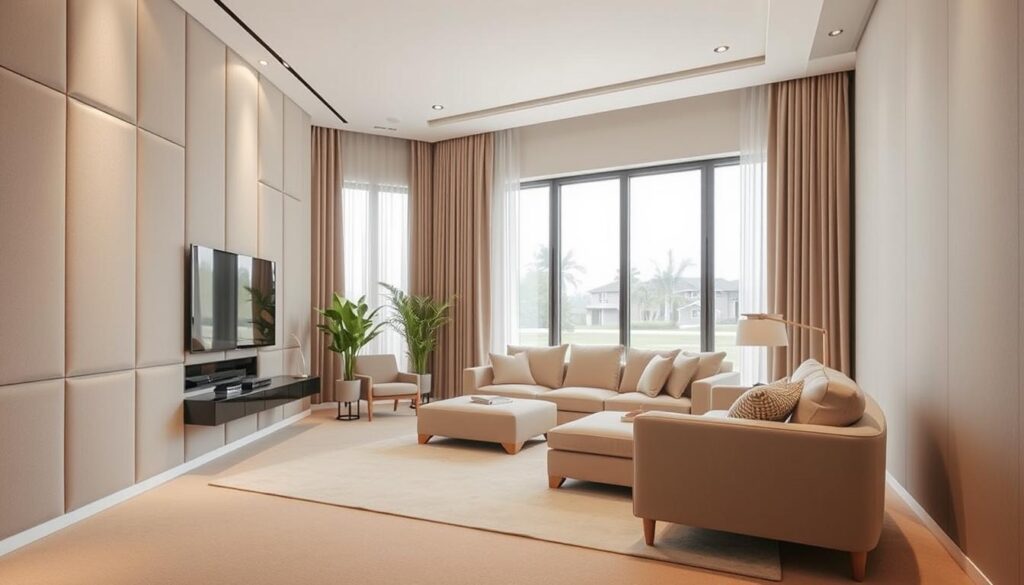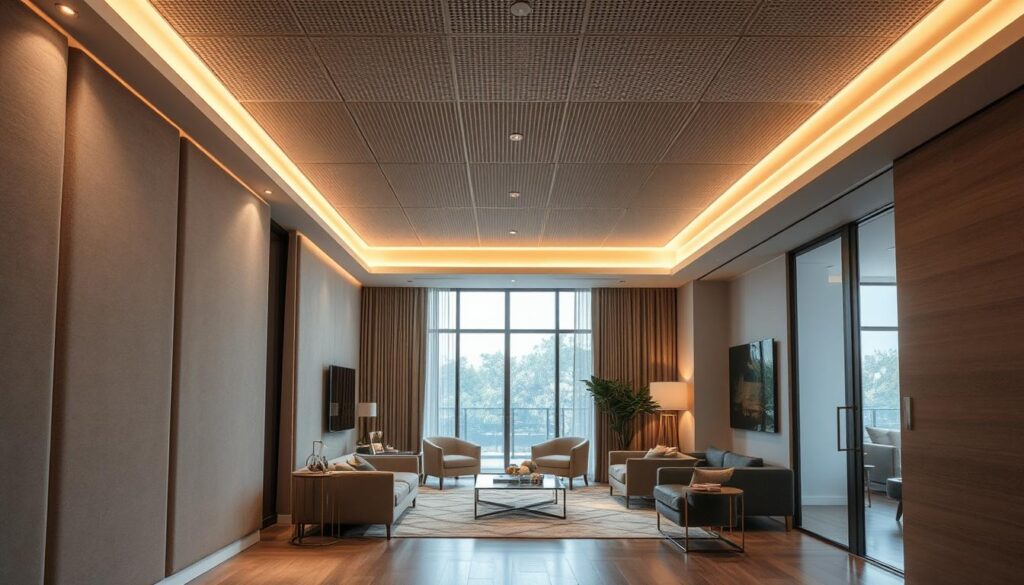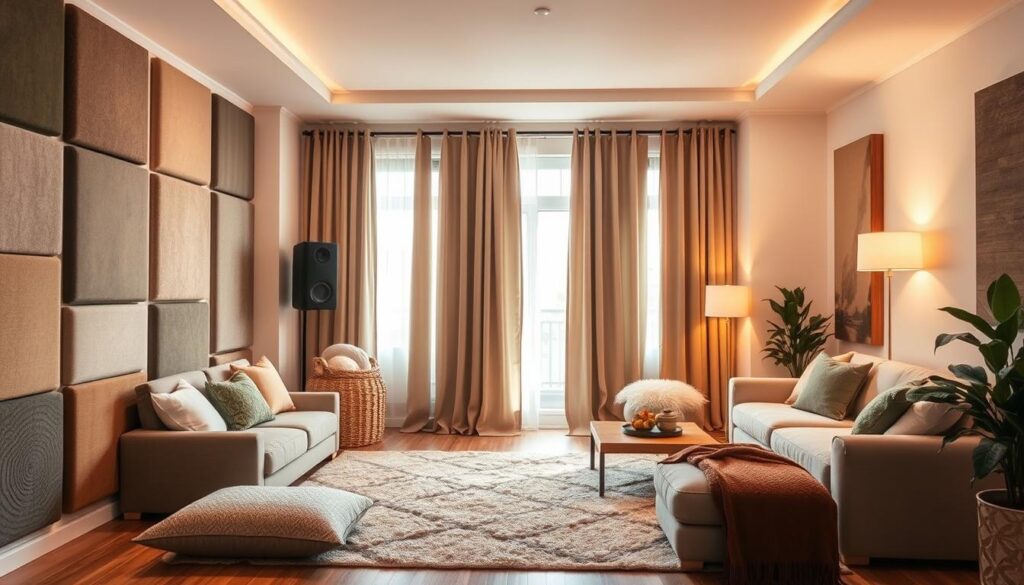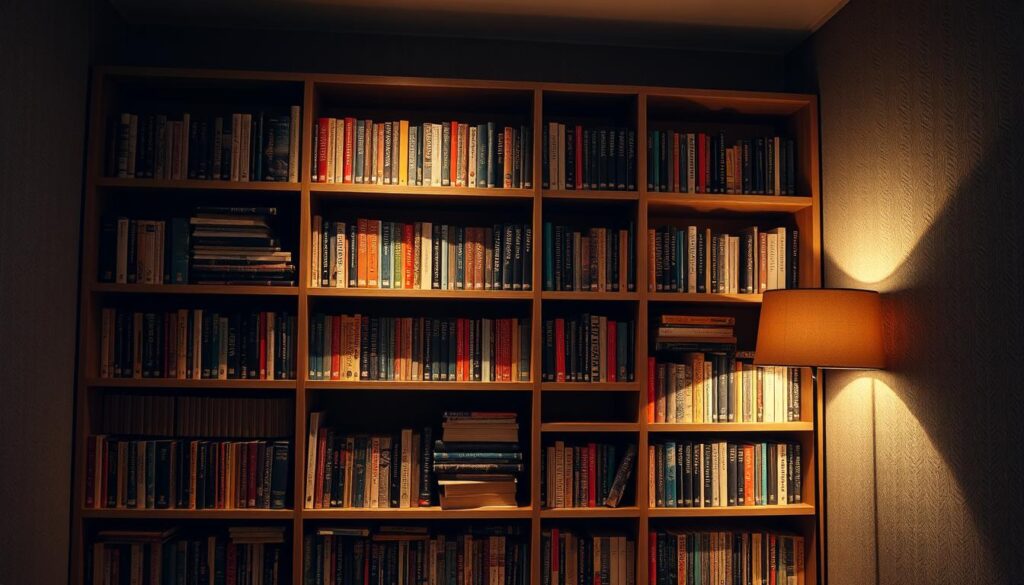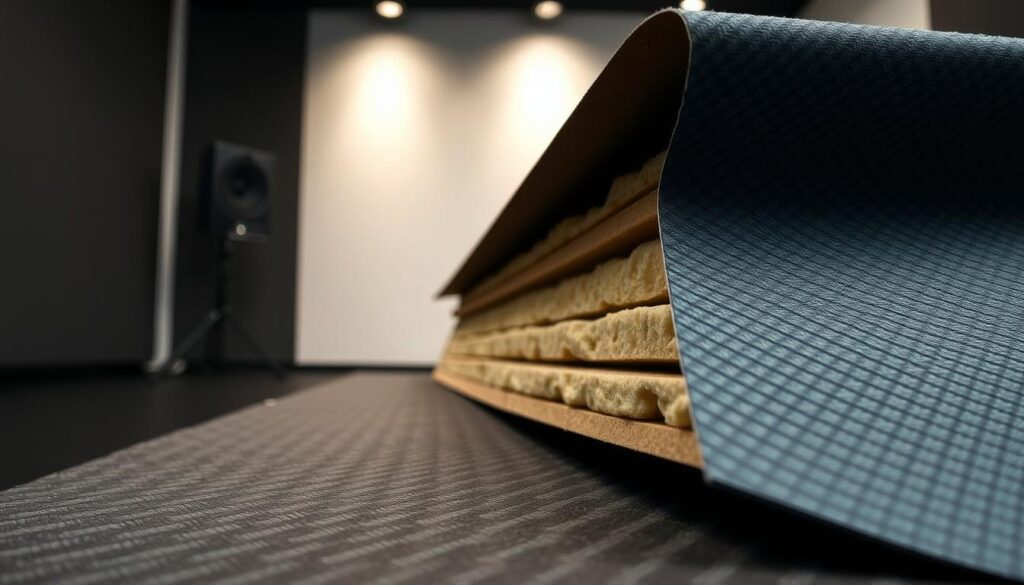As a homeowner, you’re always looking to make your home better. One great way is through soundproofing. It makes your home quieter and more peaceful. This can make your home more appealing to buyers if you sell.
Soundproofing also boosts privacy and energy efficiency. These perks can raise your home’s resale value. In this article, we’ll dive into soundproofing’s benefits and how it affects your home’s worth. We’ll help you decide if it’s a smart investment for you.
Understanding Soundproofing and Its Benefits
Soundproofing can really change how you see your home. It’s not just about blocking out noise. It’s about making your home a peaceful place that improves your life.
What is Soundproofing?
Soundproofing means making your home quieter by using special materials and methods. It stops sound from moving from one place to another. Good soundproofing can greatly change how you feel at home.
Types of Soundproofing Materials
There are many soundproofing materials, each with its own use. Here are some common ones:
- Acoustic panels: These absorb sound, cutting down on echo and reverberation.
- Insulation: It helps block noise through walls, floors, and ceilings.
- Soundproofing blankets: Flexible and easy to use, they cover doors, windows, or walls.
- Mass Loaded Vinyl: A heavy, flexible vinyl sheet that dampens sound.
| Material | Primary Use | Effectiveness |
|---|---|---|
| Acoustic Panels | Sound Absorption | High |
| Insulation | Noise Reduction | Medium to High |
| Soundproofing Blankets | Sound Dampening | Medium |
| Mass Loaded Vinyl | Sound Dampening | High |
Pros and Cons of Soundproofing
Soundproofing has many benefits, like increased privacy, reduced noise pollution, and a more comfortable living environment. But, there are also downsides, like the cost and sometimes needing a pro to install it.
Thinking about these points can help you decide if soundproofing is right for your home. And how to go about it.
The Connection Between Soundproofing and Home Value
Soundproofing and home value are closely linked. It can boost your home’s appeal and resale value. By cutting down on noise, you make your home more inviting to buyers.
How Soundproofing Affects Property Valuation
Soundproofing can greatly influence your home’s value. A soundproofed home can sell for more because it’s more comfortable. This is key in noisy areas where noise is a big problem.
Here’s how soundproofing impacts your home’s value:
- Less noise pollution means a better living space
- More comfort and privacy for those living there
- A higher quality living environment
| Soundproofing Feature | Impact on Property Valuation | Buyer Appeal |
|---|---|---|
| Acoustic Panels | Increases | High |
| Soundproofing Insulation | Moderately Increases | Medium |
| Sealed Windows | Significantly Increases | Very High |
Neighborhood Noise Levels and Home Appeal
Neighborhood noise can really impact your home’s appeal. A quiet home in a loud area is a big plus. It offers a peaceful escape from outside noise. Soundproofing can lessen the noise impact, making your home more appealing to those who seek quiet.
Understanding the link between soundproofing and home value helps you make smart choices. Whether selling your home or improving your living space, soundproofing is a smart move.
Enhancing Comfort with Soundproofing
Soundproofing is more than just a construction technique; it’s a way to improve your quality of life. By investing in soundproofing, you can create a more comfortable and peaceful living environment. This enhances your overall well-being.
Creating a Quieter Living Space
A quieter living space is essential for relaxation and rejuvenation. Soundproofing can help reduce noise levels, making your home a haven from the outside world. This is crucial for homes in noisy areas or with thin walls.
Benefits of a Quieter Home include improved sleep quality, reduced stress levels, and increased focus. By minimizing distractions, you can enjoy a more peaceful living space. This promotes relaxation and calmness.
The Impact on Daily Life and Productivity
Soundproofing can have a significant impact on your daily life and productivity. By reducing noise distractions, you can focus better on your work or studies. This leads to increased productivity and efficiency.
A study on the effects of noise reduction on productivity found that employees working in quiet environments were more productive and had better work quality. The table below summarizes the findings:
| Noise Level | Productivity Level | Work Quality |
|---|---|---|
| High | Low | Poor |
| Medium | Moderate | Average |
| Low | High | Excellent |
As shown in the table, reducing noise levels can lead to significant improvements in productivity and work quality. By investing in soundproofing, you can create a more conducive work environment. This enhances your overall performance.
Soundproofing as a Selling Point
In today’s world, soundproofing your home can really help attract buyers. It makes living there better and is a big plus in a busy real estate market.
Attracting Buyers with Quiet Spaces
More and more, people want homes that are quiet and peaceful. By adding soundproofing solutions, you make your home more appealing. Quiet spaces are now a must, not just a nice-to-have, in noisy cities.
Soundproofing changes how people see your home. It’s not just about less noise; it’s about creating calm and comfort. This can set your home apart from others without these features.
Marketing Your Home’s Soundproof Features
After soundproofing, it’s important to show off this feature. Talk about the peaceful living environment and its benefits. Use catchy phrases like “soundproofed for serenity” or “quiet living at its best” in your ads.
When showing your home, point out the soundproofing you’ve done. Mention things like acoustic panels or special insulation. This shows value and what buyers can expect.
By focusing on soundproofing, you attract buyers who want a quieter, more comfortable home. This is great in competitive markets where standing out matters.
Common Soundproofing Techniques in Homes
There are many ways to make your home quieter. Using the right soundproofing solutions can greatly improve your living space. It not only makes your home more comfortable but also increases its value.
Acoustic Panels and Their Effectiveness
Acoustic panels are a top choice for soundproofing. They soak up sound, cutting down on echo and reverberation. By adding these panels, you can lessen the impact of loud music or talking.
These panels work best when placed on walls or ceilings, which is great for rooms with high ceilings or hard floors. It’s important to pick the right panels for the type of noise you’re trying to block.
Insulation Methods for Soundproofing
Insulation is also key in soundproofing. It helps block sound from moving between rooms and from outside. There are many insulation types, like fiberglass batts, cellulose, and spray foam, each with its own sound-blocking abilities.
- Fiberglass batts are a budget-friendly choice for walls, floors, and ceilings to block sound.
- Cellulose insulation is another good option that can be blown into walls and attics for both heat and sound insulation.
- Spray foam insulation seals gaps and offers top-notch sound resistance.
Using acoustic panels with the right insulation can give you a full noise reduction solution. This makes your home more comfortable and livable.
The Cost of Soundproofing versus ROI
Deciding to soundproof your home means looking at costs versus benefits. You might wonder if the investment will pay off in the long run.
Soundproofing costs can vary a lot. This depends on materials, area size, and project complexity. On average, homeowners spend $500 to $5,000 or more.
Average Cost of Soundproofing Projects
Soundproofing costs include materials and labor. Acoustic panels, blankets, and insulation can cost from a few hundred to several thousand dollars. Professional installation adds to the total cost.
- Basic soundproofing materials (e.g., acoustic panels): $200-$1,000
- Advanced soundproofing solutions (e.g., professional-grade insulation): $1,000-$3,000
- Labor costs for installation: $1,000-$2,000
Understanding the total cost is key to deciding if soundproofing is right for your home.
Evaluating Return on Investment
To see if soundproofing is worth it, think about its effect on resale value. Research shows it can increase home value by making it more appealing to buyers.
The ROI for soundproofing can be high, even in noisy areas. It improves living conditions, making your home more attractive.
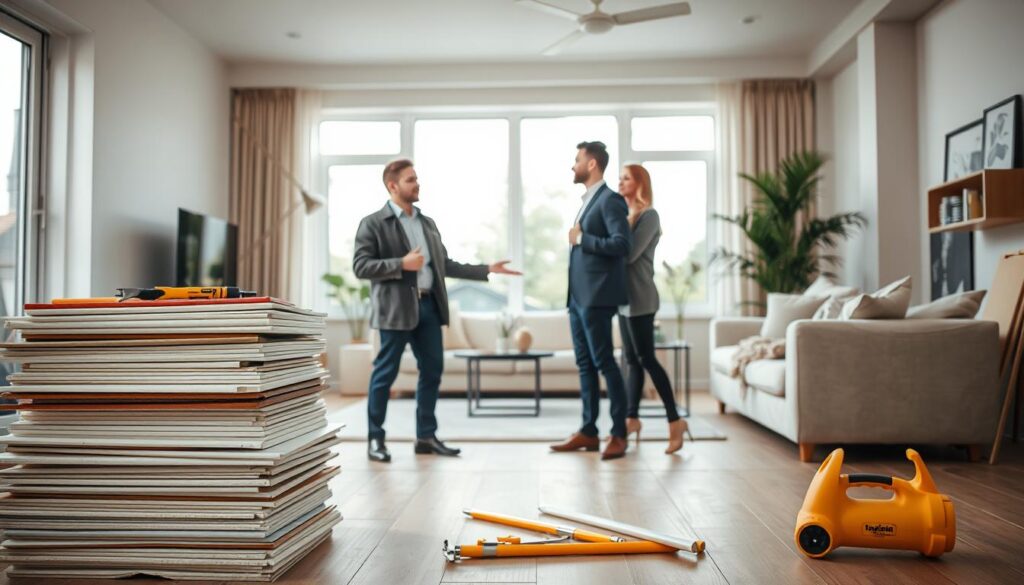
When looking at ROI, consider the local market, soundproofing type, and how it compares to other homes. A well-soundproofed home can sell faster and for more.
In summary, while soundproofing costs may seem high, it can increase your home’s resale value. This makes it a good investment for many homeowners.
Soundproofing and Energy Efficiency
Soundproofing your home can save a lot of energy and make it more efficient. It helps keep your home warm in winter and cool in summer. This means you use less heat and air conditioning.
How Soundproofing Contributes to Energy Savings
Soundproofing materials, like insulation, stop heat from moving through walls and ceilings. In winter, they keep warm air in, and in summer, they keep cool air out. This makes your heating and cooling systems work less, saving energy and money.
Also, soundproofing reduces air leaks through gaps and cracks. These leaks can let heat out in winter and in during summer. Sealing these gaps with soundproofing materials boosts your home’s energy efficiency.
Soundproofing Solutions that Insulate
There are many soundproofing options that also insulate, saving energy. For example, acoustic panels on walls and ceilings cut down on echo and heat transfer. Soundproofing blankets and insulation in attics and walls do the same.
- Mass Loaded Vinyl: A thin, flexible sheet for soundproofing walls and ceilings.
- Acoustic Caulk: Seals gaps and cracks, stopping air leaks and noise.
- Insulation Materials: Fiberglass and cellulose for walls and attics, soundproofing and insulating.
Adding these soundproofing solutions to your home makes it quieter and more energy-efficient. It’s more comfortable and can increase your home’s value. It attracts buyers who want energy-efficient homes.
DIY Soundproofing Tips for Homeowners
Making your home quieter is simpler than you might think. With the right DIY soundproofing methods, you can greatly improve your home’s comfort. It’s a project that’s worth the effort for any homeowner.
Simple Solutions You Can Implement
There are easy DIY soundproofing tips to help reduce noise at home. One great method is using acoustic panels to soak up sound. Place them on walls or ceilings to cut down on echo and noise.
- Seal gaps and cracks around doors and windows to stop sound from escaping.
- Use weatherstripping to seal gaps under doors.
- Add area rugs and upholstered furniture to absorb sound.
Another easy fix is using soundproofing curtains or blinds to block out outside noise. Also, rearranging your furniture to act as a buffer between noisy and quiet areas can work well.
When to Call in the Professionals
While DIY soundproofing works for small noise problems, sometimes you need a pro. If you face big noise issues or can’t find the source, get expert help.
Experts can figure out what your home needs for soundproofing and suggest the best options. They can also tackle tougher tasks like installing soundproofing insulation or building soundproof rooms.
- If you’re redoing your home, consider hiring pros to include soundproofing in your plans.
- For serious noise problems, experts can create custom solutions for your home.
Real Estate Trends in Soundproofing
The real estate market is changing fast. Soundproofing is now a key feature in homes. Buyers want homes that are quiet and peaceful.
Soundproofing is not just a luxury anymore. It’s a feature that can raise a home’s value. Buyers are willing to pay more for homes that are quiet.
Popularity of Soundproofed Homes in the Market
Soundproofed homes are becoming more popular. People want homes that are quiet. The benefits of soundproofing, like less noise and better energy use, are why.
- Soundproofing makes homes quieter and more comfortable.
- It can make a home more valuable to buyers.
- It can also save energy by keeping heat in or out.
Regional Differences in Buyer Preferences
What buyers want in soundproofing changes by region. In cities, where it’s noisy, soundproofing is a big deal. But in rural areas, where it’s quieter, it’s not as important.
Knowing these differences helps homeowners and real estate agents sell soundproofed homes. By showing the benefits, sellers can attract buyers who want quiet homes.
Assessing Your Home’s Soundproofing Needs
Understanding your home’s soundproofing needs is key to a quieter living space. You must know the sources of noise and where soundproofing is needed.
Identifying Noise Sources in Your Home
Noise sources differ from home to home. Common ones include gaps around doors and windows, thin walls, and loud appliances. To find these, walk through your home and listen for outside or room noises.
Key areas to inspect include:
- Windows and doors for gaps or cracks
- Walls and ceilings for thin or poorly insulated areas
- Floors for creaks or gaps between the floor and baseboards
- Appliances and plumbing for noise generation
Prioritizing Areas for Improvement
After finding noise sources, decide which areas need the most work. Look at how bad the noise is and what soundproofing solutions work best.
Consider the following factors when prioritizing:
- The level of noise disturbance
- The frequency of the noise
- The potential impact on your quality of life
- The cost and feasibility of soundproofing solutions
By carefully assessing your home’s soundproofing needs and focusing on the most important areas, you can make your home quieter and more comfortable.
Conclusion: Is Soundproofing Worth the Investment?
Soundproofing can make your home more comfortable and valuable. It can also make your home more appealing when you sell it. Knowing the benefits and costs helps you decide if it’s right for you.
Resale Value and Soundproofing Considerations
Soundproofing can really boost your home’s resale value. A quiet home is attractive to buyers who want peace. Think about how soundproofing can make your home more appealing to others.
Soundproofing for a Better Living Space
Soundproofing is key whether you’re selling or just want a better home. It reduces noise, making your home more enjoyable. Consider how soundproofing can make your home better and more valuable.
